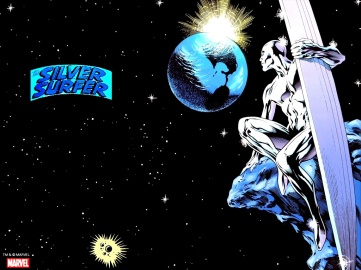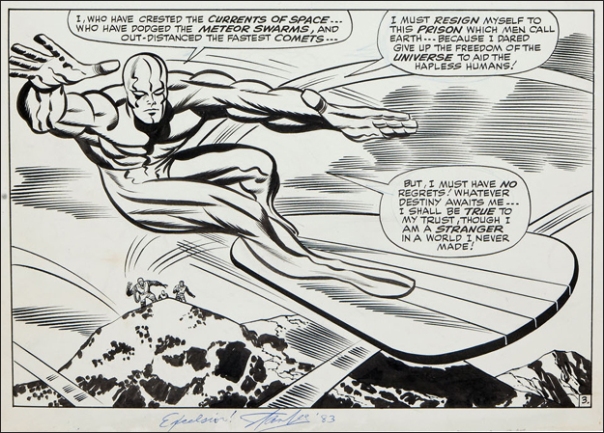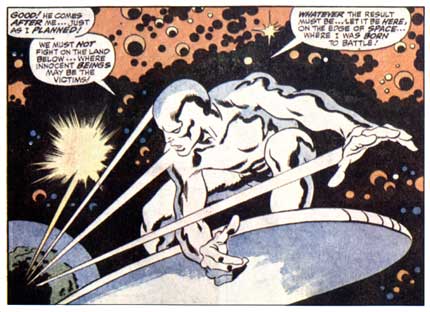The Silver Surfer is ridiculous
Posted by Ron Edwards
A while back I posted at the Forge about playtesting Doctor Xaos, and came up with this little skit, now partly modified for excellence and context:
“Come on … the Silver Surfer? I mean, with a surfboard?”
“It’s so awesome. He was the herald of Galactus, the Devourer of Worlds, but then he gave up the ability to skim the spaceways, man … for us! For Earth! He couldn’t be complicit in the slaughter and, and serve unfettered arrogant power any more. And now he’s trapped here. This is literature! Like Shakespeare and Tolstoy and Homer!”
“You’re serious. … Dude, he rides around on a flying surfboard.” (skims comic, doing impromptu vocal rendition of Wipe Out riff) “OK, the story’s pretty good, but -“
(beginning to squirt tears) “Are you not understanding? Do you not see the essential conflict, where the alien turns out to be the most human of us all? Where experiential indulgence meets its limits in the face of universal shared responsibility? How justice must be striven for, against all odds and despite all sacrifice? He, he even gave up his true love! As Norrin Rad, he loved Shalla Bal, and she him! And -“
“Wait, his name is … Rad? And his girlfriend is Shallow Ball?” (gives up, doubles over laughing)
“Give me that comic back! You’re not allowed to touch it any more! I hate you!”
The horrible thing is that I was able to compose the comics-fan dialogue effortlessly and had to stretch to reach the mind-set of the other guy.
In the game Doctor Xaos, this is why the Cheese Rule is specifically not called out to apply to anyone but the title character, most especially not to the lesser villain. When it comes to superhero/supervillain comics, there is no such thing as good vs. bad powers, good vs. bad justificaton, or good vs. bad genre concept. There is only engaging vs. worthless story content (I’m including both words and pictures in that), and that’s it. If the story content is engaging, and I do mean rock-solid, wow, I am on it, what happens next, then even the most absurd nonsense can get thrown in for powers, justification, or genre concept, and it does not detract.
Think about that for role-playing games.
- Presumed intrinsic coolness of powers/skills/whatever is a red herring, and I’m speaking as an 80s Champions jock when I say that.
- Justification of powers-concept is a red herring and I’m speaking as a lifelong devotee of science fiction when I say that.
- Setting is a red herring, and I’m speaking as a role-player with impeccable old-school 70s cred when I say that.
None of these generates that central engagement. What does? I believe I know, and this whole blog is pretty much my answer. I focus on the difference between (i) a powerful story in its entirety, when you’re done reading or viewing or hearing it, and (ii) powerful story components as they are encountered and as they change during reading or viewing or hearing it. Note as well my phrasing two paragraphs above, not “story,” but “story content,” because I want to focus on (ii).
That’s huge. That focus is mostly absent in my experience from all academic or analytical blithering about story engagement and content. They want to talk about the whole thing, whether before, frozen in the mind of The Brilliant Author or after, out there in the wild as Sociological Agent, whereas I want to talk about what it’s like to be encountering it now.
This is why I can even go beyond what I said above, when I say that absurd nonsense for powers, justification, or genre concept changes nothing – I want to revise that, to say, particularly absurd stuff can bring the powerful story content forward even more forcefully, even more engaging. There is no such thing as “suspension of disbelief.” There is only the success or failure of this exact sort of content.
He might have disavowed his assigned “Jolly Jack” tag, but there are reasons he’s called King Kirby, and this is one of them.
This too is why the Doctor Xaos game rules now say that the lesser villain player needs to be someone conversant with the rules, preferably through prior play, not, as I’d mistakenly written in a prior draft, someone who was intimately familiar with superhero comics. It’s a mechanics thing; I want the broader range of choices and the (Shakespearean! Tolstoy-ian! Rilly!) depths of those choices available without grappling with rules options.
Be ridiculous. You’re in good company:
Next: BONUS POST: The Black Panther(s), the Coal Tiger, and US
Posted on March 29, 2015, in Heroics, Lesser is still great, Storytalk, Supers role-playing and tagged Cheese rule, cosmic zap, Doctor Xaos RPG, Jack Kirby, John Buscema, Leo Tolstoy, Moebius, Silver Surfer, Stan Lee, suspension of disbelief fallacy, WIlliam Shakespeare, Wipe Out. Bookmark the permalink. 12 Comments.





The Many (Okay, Three) Moods of the Silver Surfer
LikeLike
http://i0.wp.com/tvwriter.net/wp-content/uploads/2012/06/silversurfercomic.jpg?resize=450%2C417
LikeLike
LikeLike
Three perfectly good moods. What’s your point?
LikeLike
….And repeat.
So, yeah, the Silver Surfer isn’t so much ridiculous as terribly repetitive. He generally seems to work better in space, since, y’know, “Sky-Rider of the Spaceways” and all. Englehart was the first to really work that angle, in the late 80’s series, and it’s actually pretty good: miles better than the dreck Englehart was writing on other titles of the time.
As to your broader point, I’m always at a loss when people start talking about “realistic” super heroes, or a setting that takes super heroes “seriously” or whatnot. Super hero comics have to be FUN. You can reach fun from a couple of different avenues–“Watchmen” is pretty downbeat; Fraction & Aja’s “Hawkeye” is laid-back and chill; the Kirby-Lee “Fantastic Four” at its best was gonzo Space-Age Pulp melodrama.
But cutting the ridiculous stuff out, before you’ve found something fun to groove on, just seems small-minded.
(There are certainly plenty of fun comics where gonzo nonsense like the Black Racer–if anything, more ridiculous than the Surfer himself–wouldn’t fit at all. And in those situations, yeah, shun the ridiculous for the sake of telling your own fun, good story. But the Black Racer is just a delightful WTF-is-this-are-you-kidding-me-why-is-this-so-compelling type of dude, and there’s presumably fun, good stories about him out there as well.)
The whole academic thing about literature, and the general indifference to thematic statements, has always puzzled and frustrated me.
LikeLike
Ron, do you know Grant Morrison & Frank Quitely’s Flex Mentallo: Man of Muscle Mystery? It’s strongly aligned with your “ridiculous lets you say powerful things” argument, though Morrison & Quitely are also making several other points about the imagination and comics publishing. Good work and highly recommended.
LikeLike
Yeah. He’s actually a whole post following up on the Marshal Law and Empowered investigations I’ll be doing. At the risk of incurring deathbolts from all of fandom, frankly, Flex is the only thing Grant Morrison’s written that I ever really liked. (leaving out what I haven’t read, being fair)
LikeLike
When I began to read Marvel comics, the Silver Surfer was the best thing ever! To my 7-year old self, he was the most deep literature I had encountered up to that point! And John Buscema drawings were out of this world.
I had even another good excuse, apart being 7 years old: I didn’t know what a surfboard was! This could be a shock to a Californian like Ron, but there are parts of the world where (at the time, at least) surfing was exotic or even unknown (the fact that the waves on the Adriatic Sea coast are usually not higher than 1 feet could have something to do with that)
Added to that, The Silver Surfer was the one of the first 4 Marvel character published in Italy (Spider-Man, Dr Strange, Daredevil, Silver Surfer) so reading it meant meeting for the first time the entire Marvel universe…
I did read the stories again when they were reprinted in the Masterworks series. The prose of Stan Lee aged very badly, but the art… it still takes your breath away!
OK, enough with the old timer’s memories: about the topic of the ridiculousness of these comics… I was thinking about similar things lately, discussing with some friends (“modern” comic fans that want their comic book very serious and deep, but still read the X-Men. Go figure…) about recent Marvel movies, and the way they mix silly moments with dramatic moments. They argued that these were “errors”, example of incoherence, and I remarked how these were clearly the moments most enjoyed by the public. How can it be an error if it works?
How can someone even READ a comic book about superheroes, without embracing silliness? They are silly at their core! It’s a silly concept, with silly tropes, silly costumes, silly powers, silly battles, often silly dialogues: it could be said that the comic book that embrace that silliness instead of hiding or negating it are the most thoughtful of them all.
P.S.: but there is always a limit: I could accept the Silver Surfer, but the Black Racer was really too much!

(we had mountains with snow, here, so I did know what he had at his feet…)
P.P.S.: Morrison is one of the most overrated comic writers in history…..
LikeLike
This is so huge when it comes to role-playing in that, historically, gamers are really, really bad at this. My poor friend Morgan who has repeatedly impaled himself on bad convention games chasing Great Moments using Gonzo Material. Year after year, stories of great anticipation and potential awesome followed by tales of horror and disappointment.
Whenever he comes to me with one of his stories I say, “And this is why I don’t run games that sound fun.” I’ve taken a cynical approach to filtering gamers by basically saying, “You don’t get to play with the weird fun gonzo toys until you show me you don’t NEED them to engage.”
On the other hand you have moments like what happened the first time I played Doctor Xaos. There was a woman at the table who created a superhero called Lady Liberty. After a brutal defeat by Doctor Xaos she later brought Lady Liberty brought back as Lady Justice who was blind. And afterwards she told me, almost in tears, that she was so thankful that she got to play a character like that because for a number of years she had been legally blind. During those years, in superhero games, she’d been trying to tell that kind transformative story and this was the first time she got to do it *for real*.
LikeLiked by 2 people
I didn’t have an opportunity to say this during our Hangouts game, but the new Dan Slott run on Silver Surfer is fantastic. It refits the Surfer into a Doctor Who style of story: with a companion from Earth, he encounters, confronts and negotiates with weird cosmic powers.
The companion gives him an opportunity to show off his ‘human’ (non-Herald, non-Power Cosmic) side.
I haven’t read too much Surfer stuff, so I don’t know if this is actually a standard structure for his stories.
I’ve read Volume 1: it’s good fun, and seems like it could run for a long time. The pessimist in me expects that it’s already been cancelled 🙂
LikeLiked by 1 person
Talking about ridiculousness… isn’t Howard the Duck a sort of 70s version of the 60’s Silver Surfer? “trapped in a world he never made” indeed…
LikeLiked by 1 person
Pingback: Pinky fingernail o’doom | Doctor Xaos comics madness